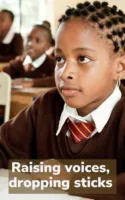“My teacher hit me with the wooden part of a blackboard duster behind my ear. I started bleeding and blood got onto my white shirt. Teachers hit all the time in my school. We are hit for being late for school, late for class. We are hit for making noise and being quiet when asked questions or getting the answers wrong in our books. My parents know that our teachers hit us. They feel like it helps us learn but I disagree.”
These words are from a 14-year-old learner attending a Johannesburg primary school. He has failed twice in his schooling life.“I hate going to school. Sometimes I don’t go. I stay home to bunk so I can be safe. I don’t like being embarrassed in front of other learners because they sometimes laugh when I get hit. I also laugh sometimes when others get hit. I don’t think hitting makes us learn better because if that was the case I would pass because I get hit so much.”
20 November marks World Children’s Day, a celebration championed by the United Nations International Children’s Emergency Fund (UNICEF) to safeguard children’s rights globally. Yet, in South Africa, the spectre of corporal punishment looms large within our schools, contradicting the mission of ensuring safe educational spaces. The testimonies of young learners, like this 14-year-old from a Johannesburg Primary School, unveil a disheartening reality. Physical violence, the norm in disciplinary measures, leaves a trail of emotional scars and hinders the very learning it purports to enhance.
In 1997, South Africa outlawed corporal punishment in schools, designating any such act as an assault. But even though it’s against the law, a shocking number shows that out of 13 million learners between 5 and 17 years old, a million say they were hurt by their teachers at school.
The culture of violence isn’t confined to educational institutions like schools; it pervades our homes, justified by cultural proverbs like “spare the rod, spoil the child” and “ a tree is twisted when it is still a sapling.” This normalisation of physical force as discipline is perpetuated by parents and educators alike, mirroring societal acceptance.
Social media amplifies this issue, showcasing distressing videos of teachers’ cruelty. Shockingly, societal outcry remains mostly muted and is often missing because many adults think this is acceptable or beneficial. In a recent thread on Facebook after a video where a small child was terrified as a teacher was beating her, most adults spoke almost fondly about the times they were beaten at school as children. They claim that that discipline built them and that no permanent harm was done. However, research proves them wrong.
According to the study by Statistics SA on Child Maltreatment, published in 2021, the use of corporal punishment can impair development in children and result in long-term negative consequences such as the child themselves being a perpetrator of violence. The maltreatment can also have detrimental effects on the mental health of the child, resulting in depression, anxiety, self-harm and – in the absolute worst cases – suicide. Smoking, alcohol abuse and drug addiction are more prevalent in children who have suffered maltreatment. There is also the dire risk of kids dropping out of school to self-preserve and leave unsafe learning environments. Children who are hit in schools also stand a higher chance of engaging in risky sexual behaviour and having early sexual debuts.
As schools and society, we urgently need to find other ways of disciplining our children. Dr Gabor Maté, a physician and author who has a special interest in childhood development, particularly on the impact of trauma, said in an interview, “Anything we do that undermines the relationship with the child will undermine the child’s development. Because it makes the child insecure, in fight or flight mode, in which mode they don’t learn anything.”
He suggests that caregivers discipline children by identifying and praising good behaviour. Teachers should also lead by example, basically by practising what they preach. Gabor says children are likelier to behave better when they see these behaviours modelled by adults.
It’s incumbent upon us as a society to shatter the myth that violence begets discipline. We must propel change by advocating for non-violent disciplinary strategies and nurturing spaces prioritising a child’s well-being. Together, we can create a culture that fosters healthy relationships, safe learning environments, and the holistic development of our future generation.
Share with us:
What do you think about the ways schools discipline kids? Do you believe that using punishment like hitting helps or hurts students in the long run? How do you think we can create safer and better learning environments for children without using violence as a form of discipline?



